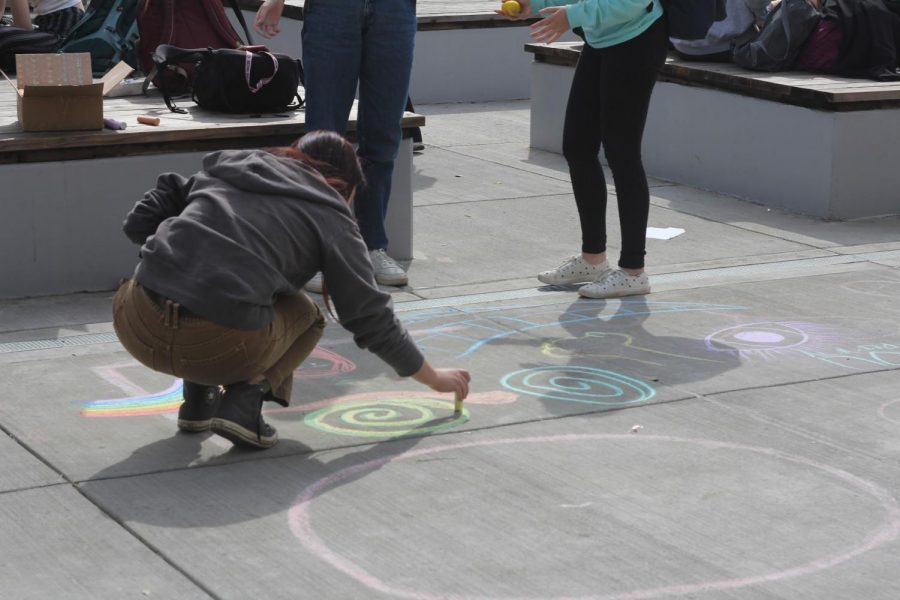Mental health awareness week promotes well-being, builds community
Senior Phebe Cox draws with chalk for a ROCK activity
On Feb. 24-28, student organizations Reach Out Care Know (ROCK) and Bring Change to Mind collaborated with the Wellness Center and multiple mental health organizations to host the first Mental Health Awareness Week. The week consisted of activities during lunch at the senior quad, as well as a movie night after school and a charity walk over the weekend.
ROCK is a student club that works toward destigmatizing mental health in the community. After months of discussion during the fall, ROCK co-presidents seniors Gwen Dunlap and Abigail Sullivan joined forces with Bring Change to Mind president senior Phebe Cox, whose organization also advocates for mental health and works toward greater education on the topic. Together, they communicated with the Wellness Center, Student Activities Director Lisa Hall and schools that hosted similar weeks to establish a solid plan for the event.
Although Gunn has hosted several wellness activities, this year marked the first official Mental Health Awareness Week. “The difference was that in the past, they had tried to do it solely run by staff and SEC,” Sullivan said. “This time, we kind of took initiative; it was a lot more student-led.”
The Wellness Center staff also points out the difference in having a student-run event. “The most important thing about these types of events [is] that it comes from people that you can relate to,” wellness outreach worker Rosie Castillo said. “If adults are doing it all the time, then nobody’s going to want to take part in it. Nobody’s going to think that it’s important because adults are telling you that it’s important.”
Some events included small, hands-on activities such as Stop the Stigma, where students wrote their thoughts on mental health stigmatization on post-it notes, or the hanging posters that symbolized solidarity. Other events consisted of more far-reaching activities, such as Wednesday’s wellness fair. The event hosted stands for various organizations around the Bay Area advocating for mental health, wellness and civic engagement.
Roya Mason, a representative from the youth mental health clinic Bay Area Clinical Associates, pointed out that the level of student engagement often differed with some activities. “I find that it’s hard to engage students with just tabling,” Mason said. “I would definitely want to figure out [how to be] more casual in some ways with my students and talk to them and not be so weird. You know, make it human.”
Because of this, some of the most beneficial events were ones that encouraged more laid- back engagement. According to Sullivan and Cox, one of the most impactful events was the student panel on Thursday during Social and Emotional Literacy and Functionality classes. During that time, a variety of representatives visited to answer student questions, including professional psychiatrists and therapists, members from the Wellness Center, counseling, Support Services for Youth and psychology teacher Haley Perkins. In addition, several members of Project Oyster, a student-run podcast emphasizing teenage struggles and mental health, were present during the event. “We had a good group of panelists,” Sullivan said. “It was a really good way to bring everything together and showcase all the things we have, but also really allow for students to get answers to basic questions and relate to people on a more personal level.” Cox elaborated on this sentiment. “[The panel] covered a lot of serious topics that could be triggering for students,” Cox said. “So I think I think it was important to kind of get all of those people there.”
Student favorites were the chalk drawing activity and the movie night showing “The Pursuit of Happyness” on Friday, Feb. 28, as well as the third Reaching Out Saves Lives walk and fundraiser on Saturday, Feb. 29. The mental health walk consisted of a five kilometer round trip from Gunn’s track to Bol Park, and all proceeds raised during the fundraiser were donated to Lucile Packard Children’s Hospital. The community event also had food booths, confetti and stands for various organizations.
Club members and Wellness Center staff hope Mental Health Awareness Week can become a regular event. “I think overall, it was really good for the first one,” Cox said. “I definitely want a lot more discussion; maybe small groups or something to talk about it afterwards.” Castillo hopes that more student-driven wellness activities will encourage outreach. “If it comes from students that are open about sharing their own experiences and why this type of work is important to them, it has a much bigger impact,” Castillo said. “When you look at little pockets of people here and there, and you see that there’s more people who are using our job and services, I think little changes like that really do show that there is some sort of impact.”
Sullivan also points out that while Mental Health Awareness Week is not targeted toward everyone, it still serves as a foundation for a supportive community. “There are quite few people who [were] probably like, ‘Oh, this week isn’t for me.’ And that’s important because not everyone needs a mental health professional,” she said. “It may not make a huge difference, but small things can make the campus a happier place, even if you don’t notice it at first.”
Your donation will support the student journalists of Henry M. Gunn High School. Your contribution will allow us to purchase equipment and cover our annual website hosting costs.


